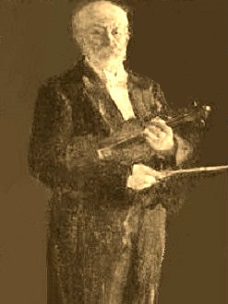Jan Hrimaly was a Czech violinist and teacher born (in Pilsen, Hungary)
on April 13, 1844. He is known for
having written a Scale Study book which is still in use today. He is unusual in that he spent the major part
of his career in Russia – in fact, once he established himself in Moscow, he
never returned to his native country.
His father was an organist and composer and his first teacher was
probably an older brother - Vojtech. All
of Hrimaly’s other brothers and sisters were musicians as well. It has been said that he and three of his
brothers actually founded the very first string quartet in Czechoslovakia. It had to have been prior to 1861. Hrimaly enrolled at the Prague Conservatory
in 1855 at age 11. His violin teacher
there was probably Moritz Mildner.
Hrimaly graduated in 1861 and quickly became concertmaster of an
orchestra in Amsterdam. Nobody seems to
know which orchestra. He was 18 years
old. He was there for four years. At age 23, he was appointed violin teacher
at the Moscow Conservatory. He then took
over as violin professor for his father-in-law, Ferdinand Laub, in 1874. He was 30 years old. Hrimaly remained at the conservatory until
the year of his death – 46 years. That
is probably one of the longest tenures of all time, if not the longest. In 1874, 1876, and 1882, he took part in
premiering Tchaikovsky’s second and third string quartets and piano trio, in
that order. Between 1874 and 1906, he
was also concertmaster of the Russian Musical Society Orchestra in Moscow,
although I don’t know what that is or was.
It can be assumed he was an outstanding teacher since he lasted so long
at his teaching post. His students
include Paul Juon, Josif Kotek, Reinhold Gliere, Stanislaw Barcewicz, Alexander
Petschnikov, Julius Conus, Michael Press, and Peter Stolyarsky. Hrimaly
died on January 24, 1915, in Moscow, at age 70.
Were it not for his scale study book, he would likely be quite
(unjustly) forgotten.
Showing posts with label Ferdinand Laub. Show all posts
Showing posts with label Ferdinand Laub. Show all posts
Sunday, March 17, 2013
Tuesday, February 7, 2012
Ferdinand Laub
Ferdinand Laub was a Czech violinist, teacher, and composer, born (in Prague) on January 19, 1832. Though he worked closely with Tchaikovsky and other famous musicians, he is almost completely forgotten today. It has been said that he lived the life of a Romantic (Bohemian) because he had no permanent residence. Since he gave a public concert at age six, he must have had lessons from infancy, though it is not known with whom he began his violin studies – it may have been his father or mother. By age nine, he was already being praised by well-known musicians, including the Norwegian violinist, Ole Bull. In 1843, he entered the Prague Conservatory, where he studied with Moritz Mildner. He was 11 years old. Archduke Stephan subsequently gave him an Amati violin and recommendations which helped Laub in Vienna. Upon leaving the Conservatory in 1846, he played in the Imperial band (Court Orchestra) in Vienna. He was 14 years old. Hungarian violinist Joseph Bohm was playing in the same orchestra at that time. In 1850, he toured Europe as a soloist and was very well received in Paris and London. From 1853 to 1855, he taught at a music school in Weimar, where Joseph Joachim had previously taught. From 1855 to 1862, he taught at the Stern Conservatory in Berlin. He was also concertmaster of the Court Orchestra there (until 1864.) In 1864, he undertook another European tour with three other musicians. Musicians with whom he came in contact included Franz Liszt, Hector Berlioz, Hans Von Bulow, Clara Schumann, Bedrich Smetana, Heinrich Ernst, and Joseph Joachim. In 1866, at age 34, he became a professor at the Moscow Conservatory. Peter Ilyich Tchaikovsky called him “the best violinist of our time.” Nevertheless, Tchaikovsky did not write his famous violin concerto for Laub – Laub died before the concerto was even begun. Perhaps it might have been – we will never know. Tchaikovsky wrote the concerto for Joseph Kotek (who later refused to play it) but dedicated it to Leopold Auer, a teacher at the St Petersburg Conservatory, who did not particularly like it and did not play its premiere. However, Laub, as first violinist of a string quartet, did give the first performances of Tchaikovsky’s first and second string quartets. In 1874, Laub was forced to stop working altogether because of illness. On March 17, 1875, he died (in Gries, Northern Italy), on his way to a spa, being only 43 years old. Laub played the Laub Stradivarius of 1722 (or 1727 – sources differ) which later went to violinist Alexander Petschnikoff and later still to Calvin Sieb, concertmaster of the Montreal Symphony. It is now presumably in the hands of one of the concertmasters of that orchestra, since the violin belongs to the orchestra. Laub’s compositions include violin and vocal works which are now never performed.
Subscribe to:
Posts (Atom)

